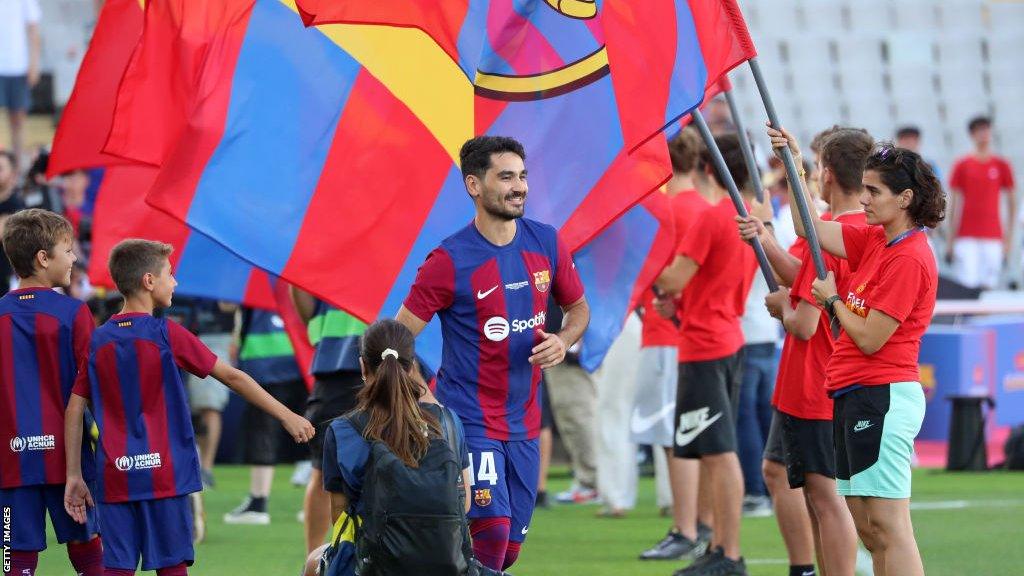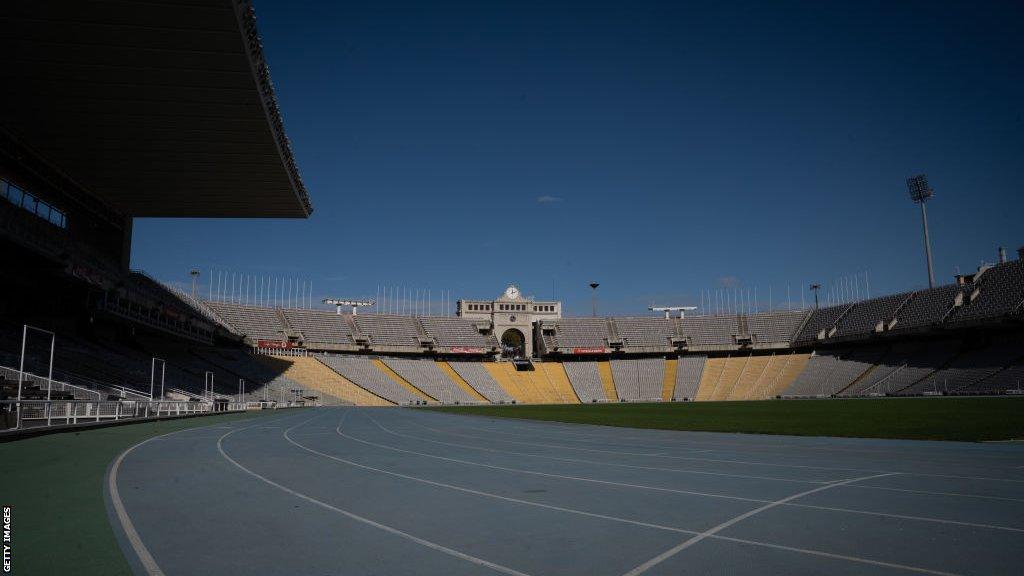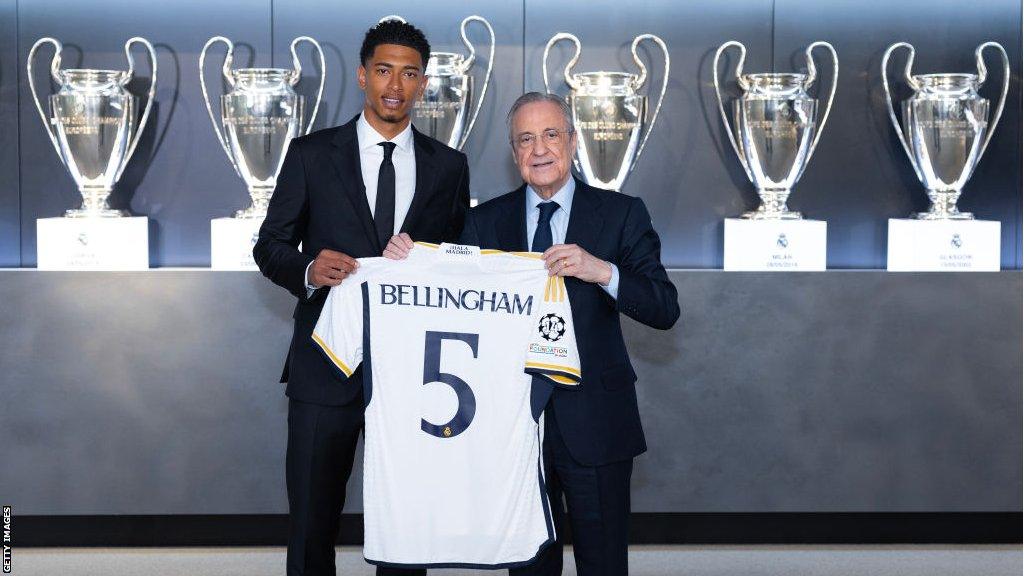La Liga: A new era for Xavi's Barcelona after legends depart
- Published

Barcelona signed Manchester City captain Ilkay Gundogan in the summer
Two months after saying goodbye to club legends Sergio Busquets and Jordi Alba - and predictably failing to re-recruit the biggest legend of them all (similarly Miami-bound Lionel Messi) - there's a sense of change in the air at Barcelona.
The Spanish giants prepare to defend the title by hosting home games at the city's Olympic Stadium during the Nou Camp's refurbishment - and with financial uncertainty hanging over their heads.
Barca's midfield has been strengthened with the arrival of Ilkay Gundogan on a free transfer from Manchester City, while former Southampton man Oriol Romeu has been brought back - he first came through Barça's youth system before joining Chelsea in 2011 - to add defensive cover and aggression.
And the exchange of Romeu for Busquets is indicative of coach Xavi's surprisingly pragmatic approach.
The new signing does not come close to boasting the subtle passing skills of the legend he has replaced, but Romeu is much more mobile than the painfully slow Busquets, who could never catch up with opposition counter-attacks when possession was lost and therefore often left gaping holes in midfield.

Barcelona will play their home games at the city's Olympic Stadium this season while the Nou Camp is refurbished
The dynamic Romeu, who excelled last season with Girona, can cover far more ground, far more quickly than Busquets. His arrival should continue the trend seen under Xavi - renowned as a high-minded purist during his playing days - of making Barca more difficult to play against without necessarily making them enjoyable to watch.
That trait was the key to Barca's title success, and the challenge for Xavi is to maintain defensive strength while also creating a more free-flowing team than the occasionally monotonous outfit which won 11 games by a 1-0 scoreline last season.
An intriguing part of that process is the loss of Ousmane Dembele to Paris St-Germain, removing Xavi's most creative player but potentially also making the team less one-dimensional and giving Raphinha, Ferran Torres and Ansu Fati more opportunities to shine.
One worrying footnote. At the time of writing, Barca's ongoing financial problems have prevented the club from registering either their new signings or existing players who have penned new contracts, so Xavi could start the campaign with some of his key pieces watching from the stands.
Pressure on Ancelotti at Real, despite Bellingham arrival
In the capital, Real Madrid boss Carlo Ancelotti is already under a fair amount of pressure following a feeble finale to the previous campaign and an unconvincing pre-season.
Specifically, Ancelotti is being chased by the shadow of the Brazilian national team managerial position. He is set to accept that role next summer when his contract at the Bernabeu expires - or earlier if he is sacked by Real first. And that remains a distinct possibility.
More than any other club, Real Madrid managers never have the luxury of basking in former glories, and the urgent need to reshape the team must be carried out quickly and smoothly for Ancelotti to survive.
The biggest question is whether Kylian Mbappe will finally be recruited to fill the Karim Benzema-sized hole in Real's attack. Currently the squad's only centre-forward is summer signing Joselu, and the former Stoke, Newcastle and Espanyol frontman - for all his aerial and hold-up qualities - is surely not capable of bearing the main goalscoring burden.
Anticipating Mbappe's possible non-arrival, Ancelotti has used the pre-season friendlies to reposition inspirational left-winger Vinicius Jr into a more central role.
But that approach did not look convincing during defeats against Barcelona and Juventus and Real simply must sign a top-class striker - even if it's not Mbappe - before the end of August.

Real Madrid signed England midfielder Jude Bellingham from Borussia Dortmund on a six-year deal for £88.5m in the summer
The team's greatest strength lies in midfield, where England star Jude Bellingham has arrived to add further quality to an unmatched group of talent already boasting Luka Modric, Toni Kroos, Fede Valverde, Eduardo Camavinga and Aurelien Tchouameni.
With that gifted bunch patrolling the centre of the field there should be no problem for Real to dominate possession and control the tempo of games.
The task for Ancelotti is to find attacking penetration to match that midfield excellence, without sacrificing the overall balance of the team. The Italian coach will also hope the problem position of left-back can be solved by the arrival of former youth team product Fran Garcia from neighbouring Rayo Vallecano and that an adequate replacement can be quickly found for injured keeper Thibaut Courtois, who will miss most of the season with a knee injury sustained on Thursday.
Real may not even present the capital city's strongest title challenge, because Atletico Madrid finished last season as the best team in Spain with 13 wins out of 19 games in the second half of the campaign.
Key to that success was the scintillating form of Antoine Griezmann, who was liberated by the loan departure of Joao Felix. The Frenchman finished with La Liga's best goals plus assists tally - 15 goals and 16 assists, while Barca's Robert Lewandowski was next with 23 goals and seven assists.
Offloading Felix - who has never truly flourished under Diego Simeone - again is a key task for Atletico in the coming weeks, and with Alvaro Morata also expected to leave there should be a big opportunity for ex-Manchester United and Barcelona man Memphis Depay to prove he can lead the line for a title-chasing team.
Who are the other contenders?
Elsewhere, Real Sociedad suffered a summer blow in their bid to build on last season's fourth-placed finish with the retirement of David Silva following a serious knee injury.
There's still plenty of talent at the disposal of canny manager Imanol Alguacil, and striker Umar Sadiq could be this season's breakout star as he returns to fitness after missing nearly the entirety of last season.
But mounting a title challenge will probably prove beyond La Real's capabilities, especially considering the extra demands of the Champions League, and it's hard to see anyone else seriously threatening the usual suspects of Barca, Real and Atletico.